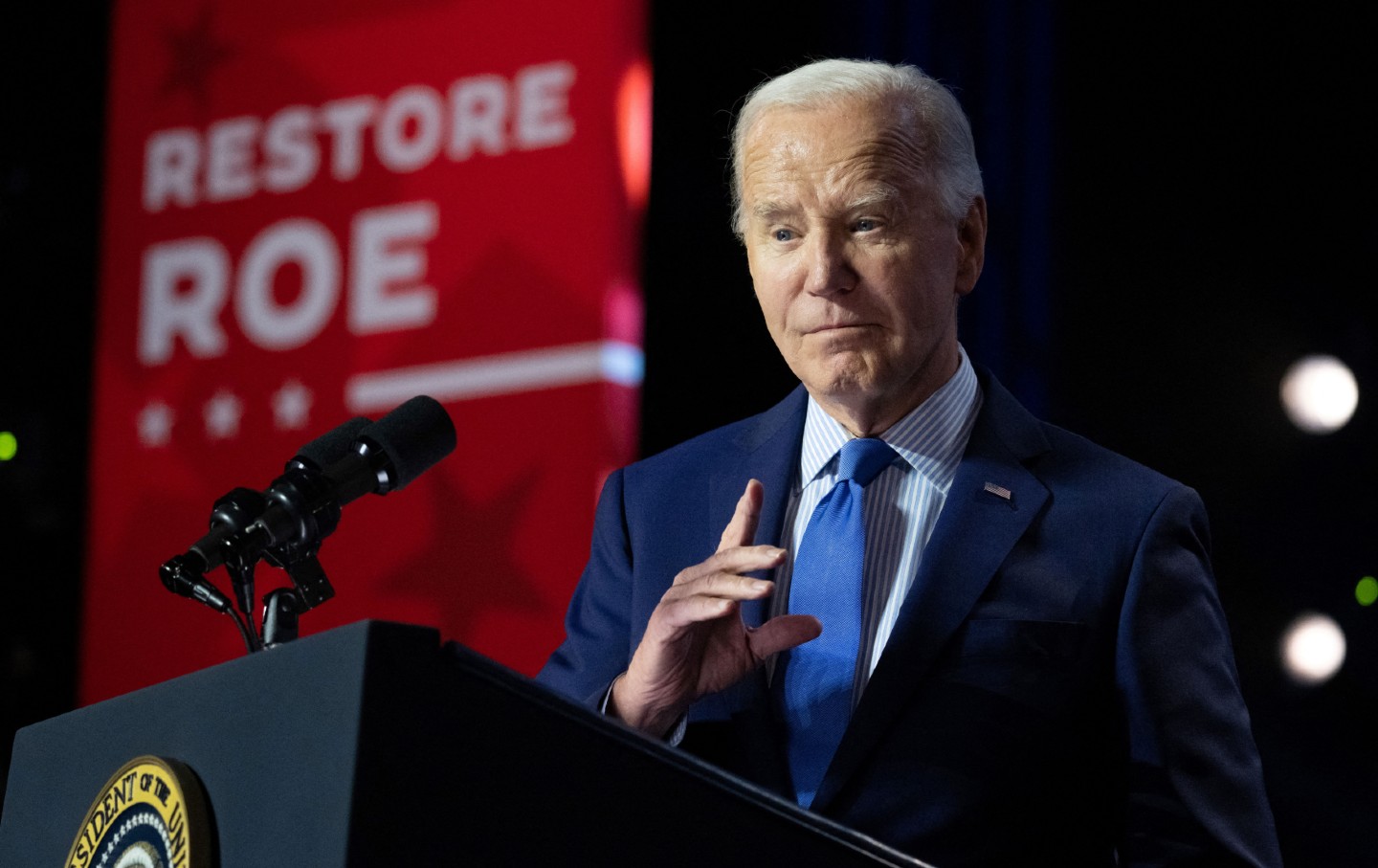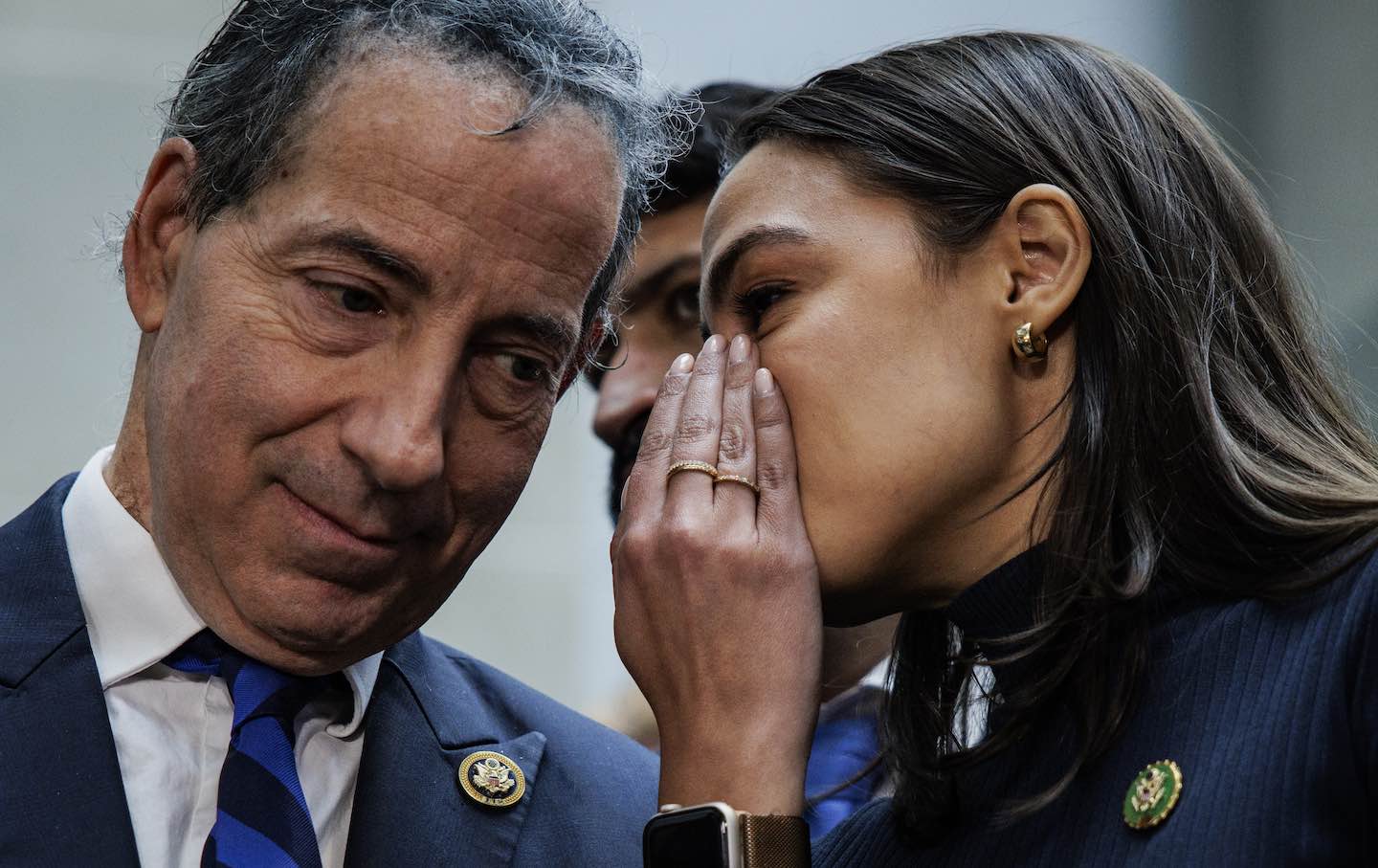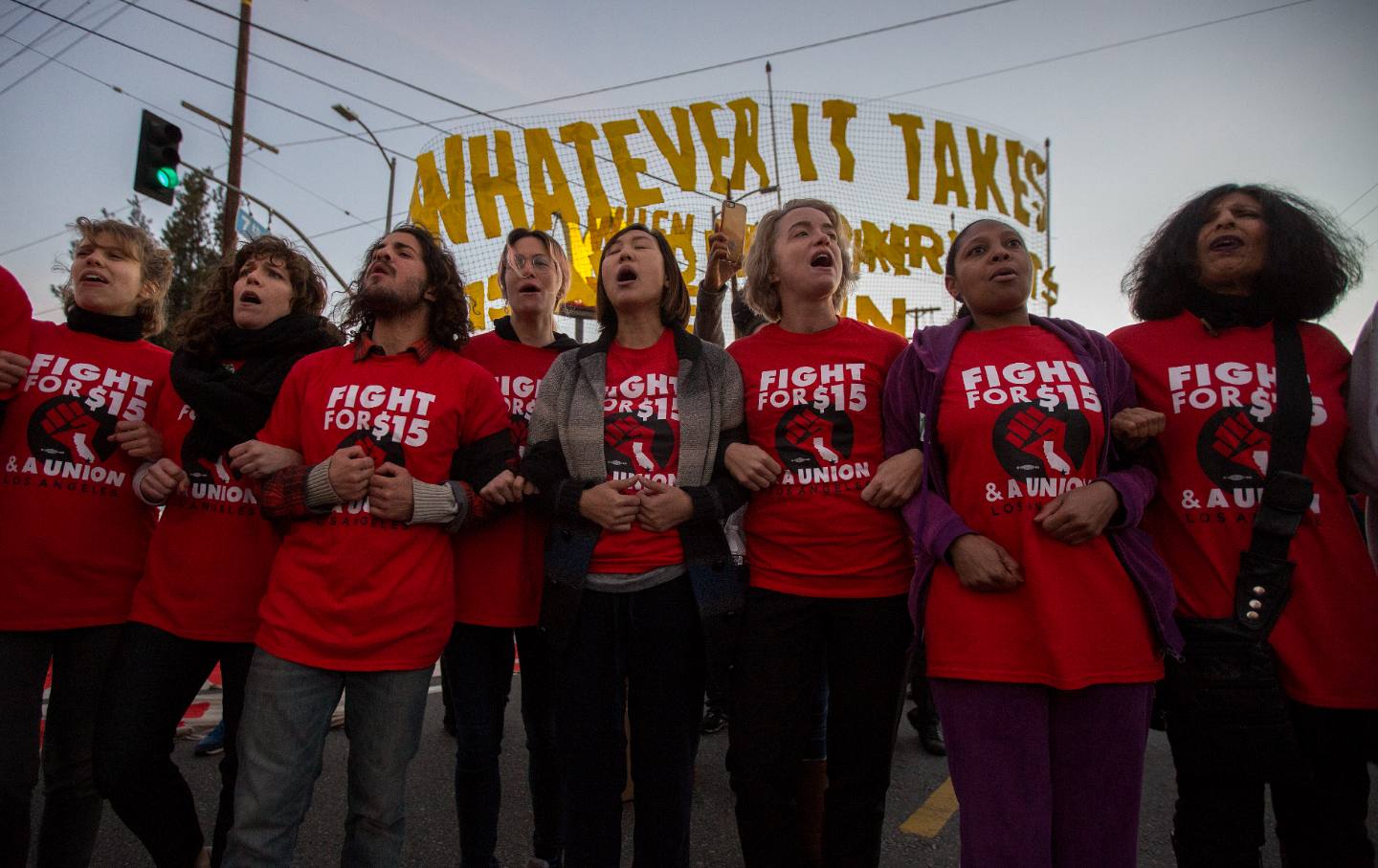Biden’s Abortion Ambivalence Is Self-Defeating
The pro-choice majority will be mobilized by clarity, not equivocation.

President Joe Biden speaks during a campaign rally to restore Roe in Manassas, Va., on January 23, 2024.
(Saul Loeb / AFP via Getty Images)Speaking at a fundraiser on Wednesday, Joe Biden said, “I’m a practicing Catholic. I don’t want abortion on demand, but I thought Roe v. Wade was right.” Biden was voicing his characteristic ambivalence and discomfort with the issue. While affirming support for a now-overturned constitutional right to abortion in the 1973 Roe v. Wade decision, Biden could only do so after making clear that abortion is something that makes him uncomfortable. He brought up his religious beliefs (not completely relevant, since polling shows Catholics support abortion in most or all cases at only a slightly lower rate than other Americans, 56 percent versus 61 percent) and then borrowed language from the anti-choice movement, which speaks of “abortion on demand” as a way of delegitimizing reproductive freedom. Even the invocation of Roe—which echoes Biden’s frequent promise to “restore Roe”—puts him at odds with pro-choice groups, which have repeatedly insisted that the goal, now that the 2022 Dobbs decision ended Roe, should be to codify into law protections of reproduction freedom that are stronger and more entrenched, rooted in claims not just of a privacy right but also the fundamental rights of women to be equal citizens.
Biden’s hedging language about abortion highlights one of the paradoxes of the 2024 election: His best hope for reelection comes from harnessing the fierce pro-choice sentiments that have erupted after the Dobbs decision, but the president is at best a reluctant warrior on the issue. Biden’s history suggests that the pro-choice position is one he came to tardily and half-heartedly in order to stay viable as a political figure in the Democratic Party.
Biden, born in 1942, was already an adult when Betty Friedan’s The Feminine Mystique (1963) heralded the emergence of second-wave feminism and with it the new push for reproductive freedom. He initially opposed Roe v. Wade. A 2019 New York Times article notes that Biden “entered the Senate in 1973 as a 30-year-old practicing Catholic who soon concluded that the Supreme Court went ‘too far’ on abortion rights in the Roe case.” In 1974, the young senator said a woman should not have “sole right to say what should happen to her body.”
As the Times documents, “In the 1980s, he repeatedly voted against funding abortions as part of the health care plan provided to federal employees and in federal prisons, except in cases where it was medically necessarily for the mother.”
Pro-choice groups quoted by the Times described Biden’s record on abortion in the 1980s as “erratic” and “unreliable.” While he came to affirm the main tenets of Roe, he would occasionally side with right-wing anti-choice politicians like Senator Rick Santorum on restricting late-term abortions, even when the life of the pregnant woman was at risk. As the Times makes clear, Biden’s full endorsement of pro-choice politics came late in his life, in 2008 when, at age 65, he became Barack Obama’s running mate.
But Biden’s recent remarks indicate that even as a pro-choice advocate, his preferred rhetorical mode is from an earlier era, notably the 1990s, when Bill Clinton spoke of wanting abortion to be “safe, legal, and rare.” But this waffling language came from the period when Roe v. Wade was the law of the land. That meant it was the anti-choice voters who were mobilized, which put a premium on trying to defuse anger over the issue. In that context, linguistic legerdemain to create ambiguity made some pragmatic sense for a pro-choice politician. But in the Dobbs era, the situation is reversed. It’s the pro-choice majority that is now angry and ready to be mobilized. Sending mixed messages makes no sense when you want to raise the salience of and passion around abortion.
There is polling evidence that the long history of Democrats equivocating on abortion hurts both the party and the pro-choice cause. As Rachel M. Cohen reported in Vox in May 2023, “two new national polls and data from three focus groups conducted in swing states (Ohio, North Carolina, and Michigan) indicated that significant numbers of independent voters remain confused and skeptical about where Republicans and Democrats stand on protecting abortion rights.” One poll showed that 43 percent of independent women “weren’t sure what Democrats’ position on abortion was.”
When independent and swing voters are quoted as saying they don’t know which party supports abortion rights, those who follow politics might be inclined to bemoan the ignorance of the electorate. But that ignorance is produced by more than just a lack of information. It’s a natural result of the fact that some leading Democrats, including the current president, have deliberately tried to muddy the waters on this issue.
Even after the Dobbs decision, Biden can’t shake a lifetime habit of speaking about pro-choice as if it were a distasteful duty. Writing in The Guardian, Moira Donegan noted, “But the new prominence of abortion in electoral politics presents something of a conundrum for the Biden campaign: because while Republicans are vehemently anti-choice, Biden himself is not a particularly convincing abortion rights advocate.”
He is, at best, unenthused about the issue. Biden speaks of abortion in stilted, euphemistic terms, talking about “restoring the protections of Roe” or “a woman’s right to choose” more than “abortion.” (He did not use the word in public remarks until he was forced to after facing pressure from activists.) On the stump, he frequently ad libs, straying from prepared remarks to make his dislike of abortion clear. In one set of remarks last year, he unhelpfully offered that he was “not big on abortion.”
There are, as Donegan suggests, work-arounds that can help minimize Biden’s abortion problem. Vice President Kamala Harris is increasingly being put forward as the White House’s spokesperson on the issue, one she speaks about with more passion and conviction than Biden can muster. As Donegan notes, “But outsourcing such a prominent issue to the vice-president is itself fraught with symbolic dangers: the campaign risks signaling that they consider abortion to be a second-tier issue by assigning it to their second-tier principal. And Harris is limited in what she can say by the somewhat narrow extent of the president’s comfort.”
The abortion issue highlights the dilemma of this presidential election. Democrats can win if they speak in the language of 2024, but they have tied themselves to a president whose entire worldview is shaped by middle decades of the last century. The horrific Dobbs decision was a political gift to the Democratic Party, but if anyone can squander that gift, it’s Joe Biden.








